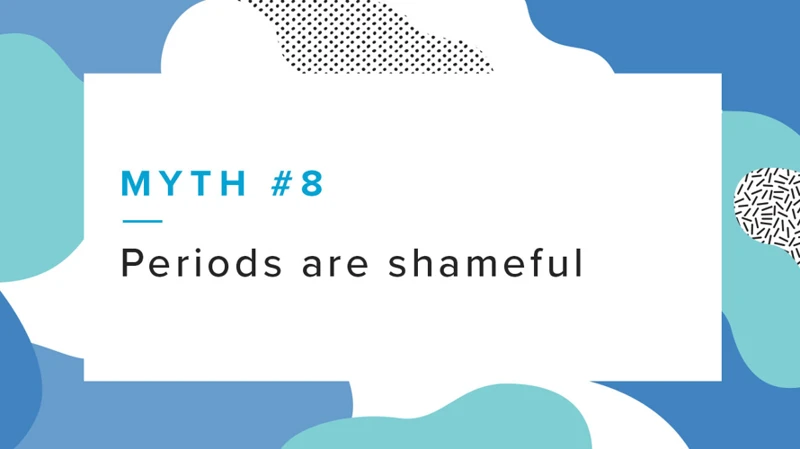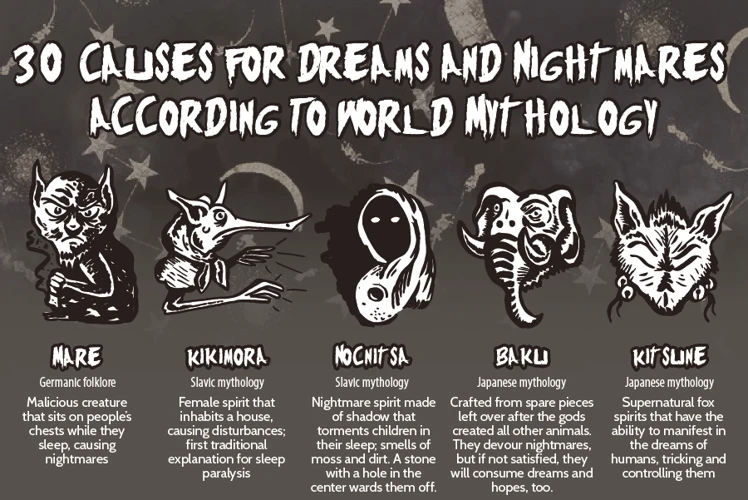Contents
- Introduction
- Myth #1: Nightmares are Just Dreams
- Myth #2: Only Children Have Nightmares
- Myth #3: Nightmares are Harmless
- Myth #4: Nightmares Only Happen During REM Sleep
- Myth #5: Medication is the Only Treatment for Nightmares
- Conclusion
-
Frequently Asked Questions
- What causes nightmares?
- Can nightmares lead to other sleep disorders?
- Are there any medications that can cause nightmares?
- Can nightmares be inherited?
- Can PTSD cause nightmares?
- What can I do to prevent nightmares?
- How can I manage my nightmares?
- Should I see a doctor if I have frequent nightmares?
- What is the difference between a nightmare and a bad dream?
- Can nightmares be a sign of a serious medical condition?
- References
Introduction

Starting from childhood, we have all experienced the frightening feeling of waking up from a nightmare. For some, this may be a rare occurrence, while for others, it may be a frequent and distressing issue. Nightmare disorders have been the topic of discussion and debate for many years within the medical community. Despite the plethora of information available, there are many misunderstandings and myths surrounding this topic. In this article, we will debunk some of the common myths and misconceptions surrounding nightmare disorders.
What are nightmare disorders?
Nightmare disorders are a type of sleep disorder characterized by frequent and intense nightmares that interfere with a person’s ability to sleep soundly. According to the American Academy of Sleep Medicine, nightmare disorder is one of several sleep-wake disorders classified as parasomnias.
People with nightmare disorder experience vivid and disturbing dreams that often wake them up during the night. These nightmares can be so frightening and unsettling that they cause significant distress and anxiety, making it difficult for an individual to fall back to sleep.
Nightmare disorder is different from other sleep disorders, such as sleep apnea, in that it primarily affects the quality of an individual’s sleep, rather than the quantity. This means that people with nightmare disorder may still get the recommended amount of sleep, but the quality of their sleep is poor, leaving them feeling tired and fatigued during the day.
| Nightmare Disorders | Sleep Disorders |
|---|---|
| Frequent and intense nightmares | Disruptive sleep patterns |
| Significant distress and anxiety | Physical symptoms (e.g. snoring, gasping for air) |
| Poor quality sleep | Quantity of sleep affected |
It’s important to note that occasional nightmares are normal, especially during times of stress or anxiety. However, when nightmares become frequent and disruptive, it may be a sign of a more serious issue. Seeking treatment from a healthcare professional can help diagnose and address nightmare disorder, improving sleep quality and overall well-being.
Myth #1: Nightmares are Just Dreams

When we think of dreams, we often envision a sweet escape into our subconscious minds, but what about nightmares? Are they simply just dreams? It’s easy to assume so, but the reality is that nightmares are much more than that. In fact, many individuals who suffer from nightmare disorders know all too well that it’s a separate and terrifying experience that often leaves them perplexed and distressed. Let’s explore the myth that nightmares are just dreams and uncover the truth behind this common misbelief.
The Difference Between Nightmares and Dreams
Nightmares and dreams are often confused to be the same thing, but they are actually quite different. Let’s examine some of the key differences between the two.
| Nightmares | Dreams |
|---|---|
| Negative and fearful | Can be positive or negative |
| Cause a heightened emotional response | Emotional response may vary |
| Often result in waking up suddenly | May lead to a gradual waking up process |
| Can be recurring | Less likely to be recurring |
As we can see from the table above, nightmares are generally negative and evoke a heightened emotional response, while dreams can be either positive or negative and may not always result in a strong emotional reaction. Nightmares can also cause sudden waking up, while dreams may lead to a more gradual waking up process. Additionally, nightmares are more likely to be recurring, while dreams are less likely to be recurring. It’s important to understand the differences between nightmares and dreams in order to properly identify and address any issues with sleep disorders.
Nightmares Can Be Traumatizing
Nightmares can be a traumatizing experience for those who suffer from them. They often leave people feeling scared, anxious, and on edge, and can even interfere with their ability to function properly during the day. The following are some ways in which nightmares can prove to be particularly distressing:
- Reliving stressful experiences: Nightmares often involve reliving stressful experiences, such as accidents, assaults, or other traumatic events that took place. This can trigger intense feelings of fear or helplessness, and leave a person feeling anxious and on edge long after they wake up.
- Disruption of sleep: Nightmares can disrupt sleep patterns, causing a person to wake up frequently throughout the night. This can lead to poor sleep quality, and leave a person feeling fatigued and irritable during the day.
- Intrusive thoughts: Nightmares can lead to intrusive thoughts that are difficult to shake off. A person may find themselves constantly reliving the nightmare or worrying that it may happen again. This can be particularly distressing if the nightmare involves something that is likely to happen in the future, such as a medical diagnosis or financial problems.
- Strained relationships: The stress and anxiety associated with nightmares can put a strain on relationships. For example, a person may be irritable or distant as a result of poor sleep quality, or may be reluctant to talk about their nightmares for fear of being misunderstood or judged.
Nightmares can be a troubling and distressing experience that can take a toll on a person’s mental health and well-being. Fortunately, there are ways to manage and treat nightmares, and seeking help from a mental health professional is often the first step in finding relief.
Myth #2: Only Children Have Nightmares

It may come as a surprise, but the prevalence of nightmares is not limited to just children. Contrary to popular belief, nightmare disorders can also adversely affect adults. Despite this, many people cling to the notion that only youngsters are prone to experiencing such unsettling dreams. Let’s explore this myth further and discover the truth about nightmares in adults.
Nightmares Affect Adults Too
It’s a common myth that only children experience nightmares, but the reality is that nightmares affect adults as well. Here are a few reasons why:
- Stress: Adults have to deal with various types of stress, whether it’s from work, family, or personal issues. Stress can lead to nightmares, especially if someone is dealing with a traumatic event or a significant life change.
- Trauma: Trauma doesn’t discriminate based on age. Adults can experience different types of trauma, such as physical or emotional abuse, violence, and accidents. These experiences can cause nightmares that can be difficult to shake off.
- Mental Health Issues: Adults can also suffer from mental health issues like anxiety and depression, which can contribute to nightmares. These issues can cause disruptions in sleep patterns, making it easier for nightmares to occur.
- Substance Use: Substance use like alcohol, drugs, or medications can lead to nightmares. These substances can alter brain chemistry and sleep patterns, causing nightmares in some people.
Nightmares can have a significant impact on an adult’s well-being, just as they do on children. It’s essential to understand the root causes of nightmares and seek appropriate treatment if they become a persistent problem.
Common Triggers of Nightmares in Adults
Nightmares are not limited to children, and adults can experience them too. There are several reasons that can trigger nightmares in adults. Here are some of the most common triggers:
| Trigger | Description |
|---|---|
| Stress and Anxiety | Stressful situations at work or home, trauma, anxiety, and depression can cause nightmares. The brain processes these experiences during sleep, and in turn, they manifest as nightmares. |
| Substance Abuse | Alcohol or drug abuse can interfere with the sleep cycle and lead to nightmares. Some sleeping pills can also trigger intense nightmares. |
| Medications | Some medications used to treat certain health conditions can contribute to the onset of nightmares. For example, antidepressants and blood pressure medications can cause vivid dreams or nightmares. |
| Eating Before Bed | Consuming heavy or spicy meals before bed can cause indigestion and interfere with sleep quality. This, in turn, can cause nightmares. |
| Sleep Deprivation | Not getting enough sleep or having irregular sleep patterns can lead to nightmares. Sleep is vital for the body to rest and repair, and not getting enough sleep can disrupt brain function and cause vivid dreams. |
| Environmental Factors | Exposure to extreme temperatures, loud noises, and bright lights can disturb sleep and cause nightmares. Sleeping in a new or unfamiliar environment can also trigger vivid dreams. |
It’s essential to identify the triggers that cause your nightmares to address the root cause of the problem. Avoiding triggers that cause nightmares or seeking professional help to address the underlying health condition can prevent the onset of frequent nightmares.
Myth #3: Nightmares are Harmless

It’s a common assumption that nightmares are harmless and will simply go away on their own. However, this couldn’t be further from the truth. Nightmares can have a significant impact on mental health and can even be indicative of underlying issues that need to be addressed. Let’s take a closer look at why it’s a dangerous misconception to believe that nightmares are harmless.
The Impact of Nightmares on Mental Health
Nightmares can have a significant impact on mental health. They can cause distress, anxiety, and fear, which can exacerbate existing mental health conditions or even cause new ones. According to a study published in the Journal of Clinical Sleep Medicine, individuals with frequent nightmares are at a higher risk for developing post-traumatic stress disorder (PTSD), depression, and anxiety disorders.
In addition to mental health disorders, frequent nightmares can also cause other negative effects on daily life. For example, individuals may avoid sleeping, which can lead to sleep deprivation and all of its associated problems, such as decreased cognitive function and increased risk of accidents.
It is important to note that not all individuals are equally affected by nightmares. Some individuals may be able to brush them off and go about their day, while others may experience significant disruption to daily life. It is important to seek help if nightmares are causing distress or interfering with daily life.
| Effects of Nightmares on Mental Health | Effects of Nightmares on Daily Life |
|---|---|
| Distress | Sleep deprivation |
| Anxiety | Decreased cognitive function |
| Fear | Increased risk of accidents |
| PTSD | |
| Depression |
Nightmares May Be a Symptom of a Larger Issue
Nightmares are not just scary dreams. In fact, they are often an indication of a larger issue. If you or someone you know experiences frequent nightmares, it’s important to investigate what might be causing them. Here are some potential underlying issues that may be linked to nightmares:
- Anxiety and Stress: Anxiety and stress are the most common causes of nightmares. People who suffer from anxiety and stress may experience restless sleep patterns and may wake up from intense dreams with feelings of terror or distress.
- Trauma: Traumatic events such as physical or emotional abuse, assault, car accidents, and natural disasters can trigger nightmares. Trauma often causes a person to relive the event through their dreams, causing intense emotional distress and impacting overall mental health.
- Depression: Depression is often linked to sleep disturbances, including nightmares. A person experiencing depression may have irregular sleep patterns, causing them to experience vivid and disturbing dreams.
- Side Effects of Medications: Some medications can cause vivid and disturbing dreams as a side effect. This is especially true for prescription medications used to treat depression or anxiety.
- Substance Abuse: Substance abuse can lead to vivid nightmares, especially for those going through withdrawal from addictive substances like alcohol or opioids.
- Sleep Disorders: Sleep disorders such as sleep apnea, restless leg syndrome, and narcolepsy have been linked to frequent nightmares. These disorders affect the sleep patterns of individuals, causing them to wake up in the middle of deep sleep cycles and experience vivid, disturbing dreams.
It’s important to remember that nightmares are not a standalone problem, but rather a symptom of an underlying issue. It’s crucial to identify the root cause of the nightmares in order to address them properly. If you or someone you know is experiencing frequent nightmares, seek help from a mental health professional, who can help diagnose and treat the underlying problem.
Myth #4: Nightmares Only Happen During REM Sleep

When it comes to the science of sleep, many myths have been perpetuated throughout the years. Among them is the common misconception that nightmares only occur during one specific phase of sleep: REM, or rapid eye movement. This belief has been challenged by recent research and may be causing more harm than good. Let’s take a closer look at the truth behind this myth and explore the potential consequences of misunderstanding the stages of sleep as they relate to nightmares.
The Three Stages of Sleep
When it comes to understanding the relationship between sleep and nightmares, it’s important to first have a basic understanding of the three stages of sleep. These stages are characterized by different patterns of brain activity and are known as:
- Stage 1: During this stage, which typically lasts for just a few minutes, you are in a transition state between wakefulness and sleep. Your muscles may still be slightly active, and your eye movements may be slow.
- Stage 2: This stage of sleep is characterized by a further decrease in muscle activity and a reduction in heart rate and body temperature. Brain waves become slower but are occasionally interrupted by brief bursts of activity.
- Stage 3: Also known as deep sleep, this stage is characterized by very slow brain waves, minimal muscle activity, and a state of decreased responsiveness to the environment. It’s during this stage that the body is believed to carry out essential restorative processes, such as tissue repair and memory consolidation.
While it was once believed that nightmares only occurred during the rapid eye movement (REM) stage of sleep, recent research has shown that they can actually occur during any stage of sleep. However, nightmares that occur during REM sleep tend to be more vivid and intense due to the increased activity in the brain during this stage.
Nightmares Can Occur During Any Sleep Stage
During a typical night’s sleep, our body goes through three stages of sleep: Non-REM (NREM) sleep, REM sleep, and a transitional stage between the two. While nightmares are commonly associated with REM sleep, they can actually occur during any sleep stage.
In fact, a study published in the Journal of Sleep Research found that over half of participants experienced nightmares during NREM sleep. This means that nightmares can happen at any point during sleep, regardless of the sleep stage.
Unfortunately, because we typically spend more time in NREM sleep than in REM sleep, nightmares during this sleep stage may be more frequent than we realize.
It’s important to note that the content of nightmares may differ depending on the sleep stage during which they occur. Nightmares during NREM sleep may be more abstract and thought-based, while nightmares during REM sleep may be more vivid and include more sensory experiences.
It’s clear that nightmares are not limited to just one sleep stage. It’s important to address any recurring nightmares with a healthcare professional, regardless of when they occur during sleep, in order to find the best treatment approach.
Myth #5: Medication is the Only Treatment for Nightmares
Are you under the assumption that the only way to treat nightmare disorders is through medication? While medication can be effective in treating nightmares, it’s far from the only option available. In fact, there are several other treatment options that can be just as effective, if not more so, in managing nightmare disorders. In this section, we’ll debunk the myth that medication is the only solution and introduce alternative treatments and lifestyle changes that can help prevent nightmares.
Other Treatment Options for Nightmares
There are various treatment options available for nightmare disorders other than medication. Let’s take a look at some of them:
- Cognitive Behavioral Therapy (CBT): This therapy can be very effective in treating nightmare disorders. It involves identifying and changing negative thought patterns and behaviors that might be contributing to the nightmares. It also teaches techniques to manage anxiety and cope with stress, which can reduce the frequency and intensity of nightmares.
- Exposure Therapy: This therapy involves gradually exposing the person to the feared object or situation in a safe and controlled environment. In the case of nightmares, exposure therapy could involve exploring the content of the nightmares and learning to develop control over the dream by altering aspects of it. This can also help desensitize the person to the content of the nightmares and reduce their intensity and frequency.
- Relaxation Techniques: Stress and anxiety are common triggers of nightmares, so learning to manage these feelings through relaxation techniques like meditation or deep breathing exercises can help reduce the occurrence of nightmares. These techniques can also improve overall sleep quality.
- Hypnosis: Hypnosis can be a useful tool in treating nightmare disorders. It involves inducing a relaxed state and encouraging the person to explore their subconscious mind. Through this process, the person can gain insight into the underlying causes of their nightmares and develop coping strategies to prevent them.
- Alternative Therapies: Some people find relief for their nightmares through alternative therapies like acupuncture, aromatherapy, or massage. While there is limited scientific evidence to support these treatments specifically for nightmares, they may help reduce overall stress and improve sleep quality, which can indirectly reduce the frequency of nightmares.
It is important to talk to a healthcare professional if you are experiencing recurrent or traumatizing nightmares. They can help determine the best course of treatment for your specific needs.
Lifestyle Changes that Can Help Prevent Nightmares
Making certain lifestyle changes can help reduce the frequency and severity of nightmares. Here are some examples:
| Lifestyle Changes | Description |
|---|---|
| Establish a bedtime routine | Going to bed at the same time every night and following a relaxing routine before sleep can help regulate the sleep cycle and reduce the likelihood of nightmares. |
| Avoid certain foods and drinks | Consuming alcohol, caffeine, and spicy or heavy meals close to bedtime can interfere with sleep and increase the likelihood of nightmares. |
| Reduce stress | Stress and anxiety can contribute to nightmares, so finding ways to manage stress, such as yoga, meditation, or therapy, can be helpful. |
| Create a calming sleeping environment | Keeping the bedroom quiet, cool, and dark can create a peaceful sleeping environment that’s less likely to trigger nightmares. |
| Engage in physical activity | Regular exercise can reduce stress and promote healthy sleep patterns, which can result in fewer nightmares. |
| Limit exposure to violent media | Movies, video games, and other forms of violent media can trigger nightmares, so it’s important to limit exposure to these stimuli, especially before bedtime. |
Note: Making significant lifestyle changes can take time and effort. It’s important to start with small changes and gradually build on them over time for best results. Additionally, if nightmares persist despite lifestyle changes, it’s important to consult a doctor or mental health professional for further evaluation and treatment.
Conclusion
In conclusion, it is important to understand that nightmare disorders are not just regular dreams and can have a significant impact on an individual’s mental health. The myths surrounding nightmare disorders can often prevent individuals from seeking the proper treatment they need.
Through debunking these common myths, it is hoped that more people will understand the severity of nightmare disorders and take steps towards managing and treating them effectively.
It is important to remember that nightmares can happen to anyone, regardless of age. They can be caused by a variety of triggers and can occur during any stage of sleep. However, with the right treatment, lifestyle changes, and support, individuals can overcome their nightmares and improve their overall quality of life.
If you or a loved one is suffering from nightmare disorders, it is important to reach out to a healthcare professional for help. They can provide the necessary guidance and support to help manage and treat this condition effectively. Remember, you don’t have to suffer alone, help is available.
Frequently Asked Questions
What causes nightmares?
Nightmares can have a variety of triggers, including stress, anxiety, trauma, medication, substance abuse, and sleep disorders.
Can nightmares lead to other sleep disorders?
Yes, frequent nightmares can lead to insomnia, sleep apnea, and other sleep disorders.
Are there any medications that can cause nightmares?
Yes, certain medications such as antidepressants, beta blockers, and blood pressure medications can cause nightmares as a side effect.
Can nightmares be inherited?
There is some evidence to suggest that genetics may play a role in the development of nightmare disorders.
Can PTSD cause nightmares?
Yes, nightmares are a common symptom of post-traumatic stress disorder (PTSD).
What can I do to prevent nightmares?
Some lifestyle changes that may help prevent nightmares include practicing stress-reduction techniques, maintaining a consistent sleep schedule, and avoiding alcohol and drugs.
How can I manage my nightmares?
Some techniques for managing nightmares include practicing relaxation techniques, keeping a regular sleep schedule, therapy, and medication.
Should I see a doctor if I have frequent nightmares?
If frequent nightmares are affecting your daily life or causing significant distress, it may be beneficial to speak with a healthcare provider who specializes in sleep disorders.
What is the difference between a nightmare and a bad dream?
Nightmares usually involve vivid and disturbing images that cause fear, anxiety, and/or distress. Bad dreams may be unpleasant, but they do not typically cause the same level of fear and anxiety.
Can nightmares be a sign of a serious medical condition?
In some cases, frequent nightmares may be a symptom of an underlying mental health condition or other medical condition. It is important to speak with a healthcare provider if you are experiencing frequent nightmares.







